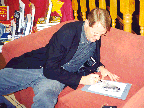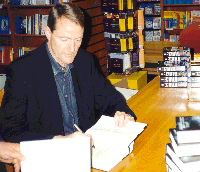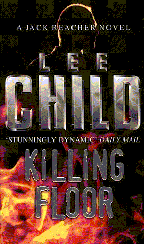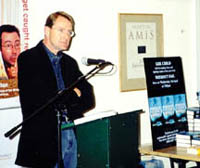|
I use the title 'Listening to Lee Child' for effect only. His voice
is a hybrid of United States/United Kingdom - English that is easy on
the ear, but is marbled with surreal observations that stop you in
your tracks and force you to think for a minute or so on some profound
metaphor he conjures up. Lee's serial character, Jack Reacher, does
the same, but prefers the steel grip of a Glock 19 because, unlike his
creator, he is a man of few words, most of which are usually lost
against the splatter of bullet casings. Lee likes to examine why
things are the way that they are. On his current tour, he has been
asking why do all watches/clocks in magazine adverts tell the same
time - ten past ten? He researched this factoid and reveals to the
audience the answer with all the glee of a carnival barker pulling
back a tattered curtain. The reason for the ten-past-ten frozen time
zone is that, that configuration most resembles a 'smile', and the
marketing folk want to lull us with the self-same smile. Lee Child
resembles that watch as he introduces us with glee to his America, as
seen thorough the eyes of Jack Reacher.
I discovered Lee's books a few years ago, after he was awarded the
Anthony for 'Killing Floor', his debut novel set against the backdrop
of Small Town America caught at war with a surreal and brutal
conspiracy. The book is peppered with strange observations and the
perceptive insight that only an outsider can truly reveal. Lee, like
his character Jack Reacher, is just that - an outsider looking within
and revealing wounds that perhaps the 'insiders' fail to see or do not
want to see.
Everybody sees Reacher differently, but once you strip him to his
core, you will find that he really is a very simple and decent man. He
is a man who lives by his own code, a man who has no quirks except the
ability to sort out problems using his mind as well as his body. I
found it amusing that a particular Latin phrase 'E Unum Pluribus'
which, roughly translated, means 'Out of one comes many' is used to
great effect in the novel's structure. My initial amusement came from
my childhood recollection of Stan Lee's catch-phrase for Marvel Comics
'E Pluribus Unum' which translated means 'One of many' which I thought
curiously apt as a contrast to Lee's work. Jack Reacher is far, far
from the stereotypes and conventions of the comic-book hero. Reacher
is a hero, but one that lives at the edge of convention, and Lee keeps
him just on that edge.
Writing about heroes is risky. Lee takes risk in his stride. What
could have ended up as disposable pulp, is now heralded as one of the
most fashionable crime series around today. It appeals on many levels,
but then again so does crime.
I have often discussed my own love of Alistair MacLean's earlier
works with Lee, especially the stories that the Scottish/American
writer told before his move from Switzerland to California; before his
addiction to alcohol dominated his life so much so, that the stories
after 'Circus' began to unravel. This revealed a reliance on formulaic
plots and less on the edgy heroes he once so skilfully carved. 'Men on
a Mission' is what Quentin Tarantino referred to in his précis
of the MacLean formula. I can report with relief that no such issues
cloud Lee's work. In fact, he has chiselled many diverse novels from
the violent, chase thriller 'Die Trying', through the classical
mystery of 'Tripwire' to the surreal, serial-killer mystery 'The
Visitor' and then back to the Neo-western roots found in his debut,
'Killing Floor' with the blistering 'Echo Burning'. In some respects,
Lee Child is more akin to Ian Fleming, another British writer who
wrote as an outsider from his beloved 'Goldeneye' retreat, setting the
action in alien contrast to the 'safe' British backdrop of his home.
The vista for Jack Reacher now becomes broadened with a panoramic
grassy knoll conspiracy mystery 'Without Fail'. Each novel is like a
'stand-alone' adventure pitting Reacher against the alien terrain that
is his country of birth, but not that of his creator, and for that
reason, the stories become hugely enriched. This enrichment is akin to
Patricia Highsmith's love of Europe and all its contradictions and
amorality that played well with her deliciously warped Tom Ripley.
European amorality even seduced Thomas Harris out of 'retirement' to
wander to Florence for Hannibal Lecter's return to his true home. The
contrast is that Jack Reacher has to survive the amorality that swirls
wherever he travels.
There is something mysterious about crossing the Atlantic Ocean that
seems to bring out the unusual in accomplished crime writers, and Lee
Child is secure in that company.
I would love to recall the vignettes Lee peppers on his tour- the
funny stories, the generous way he talks about his writing
contemporaries (especially all the folk that surround him on the shelf
marked 'C' - writers such as Crais, Connelly, Connolly, Cornwell,
Coben, to name only a few) or his pushing of less well known writers
such as the talented Brian Wiprud. I could even talk at length about
the patience he has with his hugely diverse audience, but I was asked
to interview him so I hope you enjoy the interview as much as I did.
If you get a chance - see Lee Child speak as he promotes 'Without
Fail', if not, read his books and discover Jack Reacher. When you do,
check the time - I'm sure your watch will read ten-past-ten.
When was Reacher formed in your mind? Was it in a moment or over
a long period of time?
It was over a longish time actually. Probably a ten year process to
be frank, between first of all thinking that I want to write and then
thinking I could write and then thinking Okay, what to write? It was a
slow process that he emerged but then as soon as he was fully formed
in my mind, he was the key to everything else. Because it's the
character that comes first. It's really, really important or else you
get nowhere at all without a strong central character.
When did you first hear that you'd been nominated for the
Anthony for 'Killing Floor'?
That was funny actually because I was so preoccupied at the time.
That was the summer that we moved from England to the States, so it
was a very busy summer anyway. I was very new to the writing scene; I
had no idea that there were prizes. I had no idea whether or
not it would be important or anything like that. My editor at Putnam
called me. I didn't really know what it would mean at that point and
so I said, 'That's great!' and he said, 'Are you going to go to
Bouchercon?' I said, 'No I don't think so.' He said, 'You really
should go if you've been nominated.' So I began to twig that maybe
this was a bigger deal than I thought initially, so I went to
Bouchercon and won the prize ...and it was amazing.
You also won the WH Smith's Thumping Good Read for 'Die Trying'.
How did that come about? Did the publishers push for it, or was it
just nominated?
Publishers have got to advance a number of books for consideration
for the shortlist so there is an element of pre-selection by the
publishers. So they included 'Die Trying' in their entry but, after
that, it's in the lap of the gods and it was up to a – I think -
a Smith's panel who decided a shortlist and then, as you know, the
actual prize is judged by real readers. They just pick out Smith's
customers, actual people in the street really, and they do the judging
which is why it's the prize that I'm possibly most proud of because it
is chosen, literally, by the readers at which I'm aiming. There's no
element of insider information, no professionalism, no preconceptions
at all in the judging process, they were just normal people.
Therefore, that prize meant a lot.
It was in the third Reacher novel that I realised that you
didn't use excessive bad language, but considering the intensity of
the plot, it's remarkable that I didn't twig until then. How did that
come about?
Well, it came about because although personally I use and always
have used profanity in my speech, for some very subconscious reason, I
just could not write it down on the page. I really couldn't and I also
then realised that it's impossible to capture speech realistically
unless you are prepared to fill up the page with four letter words -
which is actually how highly stressed people speak. So I thought were
into artifice here anyway, so let’s go the whole hog and make
highly stressed, tough-guy speech with no four-letter words and see if
it's possible and I think it comes across as convincing. There are a
certain number of people who are grateful that there are no
four-letter words, and I have never heard from anybody who misses them
and wishes I'd put them in.
Well it's remarkable anyway. One element I wanted to ask you -
'Killing Floor' was in the first person and you got into the mind of
Reacher and the back-story to begin with. Have you thought of
returning to that format?
Yes I have and, in fact, I have returned to it for the 2003 book,
'Persuader' which is out in the UK in April 2003. It's in the first
person again from Reacher's lone point of view.
Have you ever thought about writing in the third person from a
different character's perspective, say like Ian Fleming did with 'The
Spy Who Loved Me’?
Yeah, every time a book comes out, people really seem to like the
supporting role characters and they say are we going to see so and
so...
Jodie or ....
Is Jodie coming back? Is Harper coming back? Is Nagley coming back
from 'Without Fail?' Generally I don't like to bring people back
because I try and avoid the soap opera aspect because other people do
it so well - I think I'm going to be different. It's certainly
tempting and I did have an idea that maybe I could tell a story from,
let's say, Jodie's point of view or Nagley's point of view in the
first person with Reacher himself appearing as a supporting character.
That might be really nice, a new perspective on him.
Excellent idea. One distinctive feature of the UK editions is
the marketing strategy. Two questions really. Firstly do you get
involved at all in the marketing of the books, apart from book tours
or on the actually packaging or the covers?
Well what I've said to the publishers in terms of marketing - I will
do anything anywhere, any time to support their efforts. But equally
I've been in the media a long, long time - 25 years now, media of
different sorts and I'm very comfortable with the idea of horses for
courses. Put it this way I'd be very pissed off if the Marketing
Director started writing my books for me, so I'm certainly not going
to start planning his campaigns for him.
On that question - the silhouetted figure that says "A Jack
Reacher Novel" on your UK covers - is that anyone we know?
 It's
someone that a lot of people know. His name is Jonathan Newell who is
the Managing Editor of Bookseller magazine, and he is a fan of the
series. The photographer thought in that pose he would look
convincing, and he agreed to do it. It's
someone that a lot of people know. His name is Jonathan Newell who is
the Managing Editor of Bookseller magazine, and he is a fan of the
series. The photographer thought in that pose he would look
convincing, and he agreed to do it.
The other thing is there seems to be, particularly in 'Killing
Floor' and 'Echo Burning', a real Neo-Western feel about it. You know
- the stranger rides into town, sorts out the problems and then
disappears again. Did you consciously put that in?
Entirely unconsciously. I mean I totally agree with you - in
retrospect they are classic Westerns structures, especially 'Killing
Floor'. Although it's thoroughly contemporary, set in the present day,
it is fundamentally a western. I'm not an expert on westerns. I don't
know much about them. I haven't watched many of them. I think it must
be a subliminal influence from childhood when you know there was
Rawhide, Gunsmoke, Lone Ranger - all those things I watched as a kid.
Both you and Dennis Lehane have cited Alistair MacLean as early
influences. Could you elaborate a little bit about the Alistair
MacLean sort of ethos and where your Jack Reacher character comes in?
The thing that really strikes me when you analyse Alistair MacLean
is the way he writes heroes, which are full blooded 100% heroes, that
are teetering awfully close to 'over the top' parodies, but never,
ever falling over the edge. I liked that as a reader and I think
that's what I try and do with Reacher - make him an unequivocal hero.
You can call him an anti - hero but he really isn't, he's a perfect
hero and I try and keep him this side of parody in the way that
Alistair MacLean did.
Maggie Griffin, your website administrator, does a great job on
Leechild.com. How much involvement did you have when the web-site was
set up?
Well again like I said before in answer to an earlier question, I'm
totally comfortable with the idea of finding an expert and letting
them get on with it uninterrupted. My only involvement really was to
say 'Maggie, do me a website' and she did.
It's quite fun (Leechild.com) because you post on the forum
every couple of weeks and there's a big die-hard fan element. How do
you find coping with the e-mails people will be sending you and
catching up, as well as writing full-time?
All the e-mail goes through Maggie and she filters out the abusive
or the dodgy ones and then forwards everything else on to me. It is
getting just to the point now where it is becoming overwhelming. The
volume of e-mail is such that I am going to have to make some sort of
policy decision about it. If someone writes to me, I really feel they
need a personal reply and I would feel very bad if I didn't give them
one, but it's getting to the point where the volume is that I would
just be doing it all day and not writing.
If you could select six books form your TBR (To Be Read) pile
for a desert island holiday, are there any books that you really want
to read?
In my TBR. It's a difficult question to answer, because until you've
read them you don't know if they are going to be any good. I've got
George Pelecanos's 'Hell to Pay' - that's next in my TBR pile, beyond
that, I only look one book ahead at a time. I'm sure the Pelecanos
book will be good.
Do you have any writing rituals? Say at the start of the day?
Close of the day? Re-writing?
I have a lot of rituals, which are all completely bizarre. The main
one is that I hate a chapter that runs two lines onto the next page.
I'll edit it until it fits onto the full previous page. Same with
paragraphs. I hate a paragraph that runs one word into a line. I'll
edit it so it makes up a full line, which is stupid, of course because
once it's set into type, it bears no relation to my layout - It might
well look bad again! But writing is full of rituals and little
superstitions, and I'm a victim of most of them, I think.
An obvious question, but which writers really influenced you in
the past?
Alistair MacLean, as we've talked about, I think probably John D
MacDonald, Robert B. Parker. I would say all those guys influenced me
in a positive way. There are some writers that influence you in a
negative way, when you see either that they are doing something so
superbly well, you’re gonna stay away from it because you can't
compete, or that they are doing something that annoys you, and it
crystallises something that you need to avoid. So, potentially,
everybody's an influence.
We've also heard that you're quite a big fan of Michael
Connelly's books.1
Yes I am a fan of Michael as a 'Writer' in both senses of the word.
I love the product, but I also love the process that he exemplifies -
no fuss, no drama - just a great book every year. In many ways, that's
ninety percent of the game.
We heard a rumour that Dennis Lehane's brother prefers the 'Jack
Reacher' novels to the 'Patrick and Angie' novels - is this true?
Dennis told me that himself, so I'm assuming it's true. It's one of
two bones of contention I have with him, the other being that he's a
Red Sox fan, and I'm a Yankee's fan.
The last point is to thank you for your time. We've never seen a
'Jack Reacher' novel in a remainder bin, and long may that last.
 |
Enjoyed
what you've read?
Want to be informed
whenever the
website is updated?
Join SHOTS mailing
list.
It's FREE! |
|
|
|
|